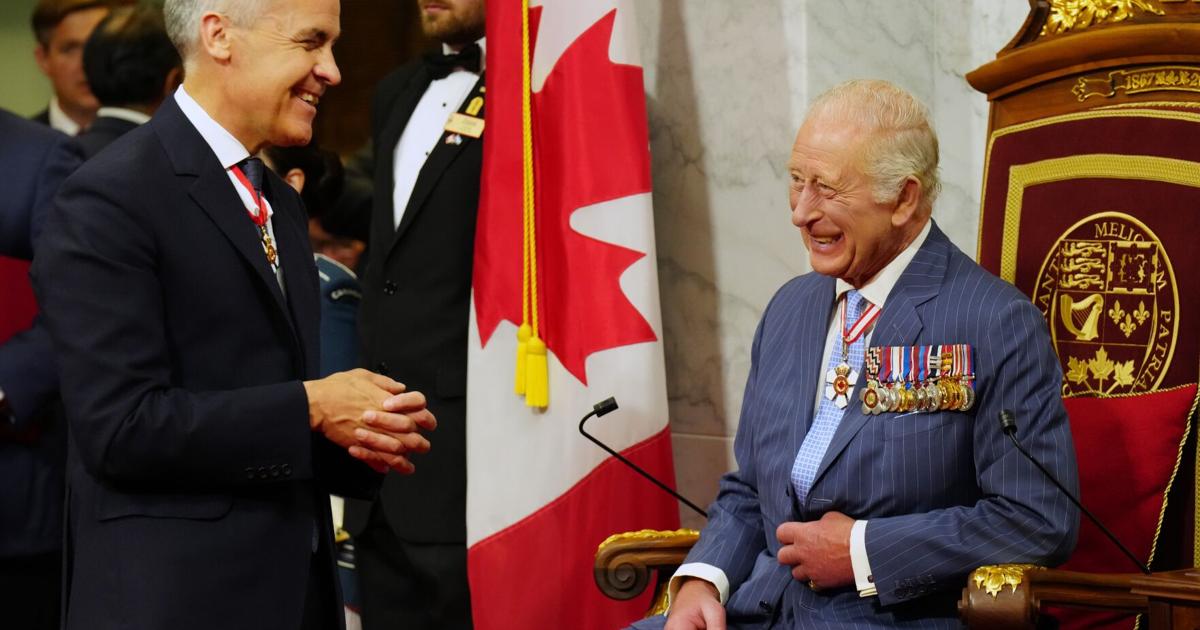OTTAWA—In a fraught moment when Canadians were looking to the British monarch to assert this nation’s sovereignty, King Charles III delivered a mic drop speech that celebrated Canada’s “distinct identity” and ended with a flourish.
“As the anthem reminds us: The True North is indeed strong and free!” said the King.
King Charles, the physical embodiment of the constitutional authority in a system distinct from the republicanism of the United States, arrived in the nation’s capital at what the throne speech called a moment of crisis, when the powerful American President Donald Trump is engaged in a trade war and agitating for territorial expansion.
The simple fact of his presence in Ottawa was meant to underscore the line between us and them.
Under a bright and clear spring sky, all eyes and ears were on the King’s initial comments, which the monarch personally wrote, as he delivered a speech composed mainly by Prime Minister Mark Carney and his office to set out the new Liberal administration’s governing agenda.
The speech itself — and the pomp and circumstance that surrounds it — are an ongoing political commitment to constitutional monarchism, distinct from the system in the U.S. which rejected the king in their revolutionary war of independence 250 years ago.
An event that opens a new Parliament, it was boycotted by the anti-monarchist separatist Bloc Québécois MPs. In large measure, the throne speech re-capped the election campaign promises of Carney’s minority Liberal government that was elected on April 28.
But in the King’s own statement, chock-a-block with declarations of Canada’s autonomy, the sovereign did some heavy lifting for the Liberal government as it stares down the Trump administration and seeks to renegotiate Canada’s relationship with its largest ally and trading partner.
His declaration started with a personalized reflection on the Crown and the country’s relationship with Indigenous Peoples, and King Charles’ wish that Canada continue on a path “toward truth and reconciliation, in both word and deed.”
In a remarkable moment, the King — the modern representative of the British Crown under whose authority this land was colonized — acknowledged the Canadian senate in which he sat stands on the “unceded territory” of the Algonquin Anishinaabeg people.
That was followed by a series of statements that underscored Canada’s distinct national character, with the King saying he admired Canada’s “unique identity, which is recognized across the world for bravery and sacrifice in defence of national values, and for the diversity and kindness of Canadians.”
In a nod to former governors-general, prime ministers, representatives who attended from all parts of Canada, the protective military and police services, as well as the newly-elected and appointed legislators of 2025, the King said, “I see the guardians of the fundamental rights and freedoms guaranteed in the Canadian Charter and, as King, I thank you for your service to your fellow Canadians, across the length and breadth of this vast and great nation.
The King made a distinct pitch for civilized discussions in the Parliament to come, and concluded his personal portion of the speech with a declaration that Canada has “dramatically changed” over the 70 years since his mother, the late Queen Elizabeth II, opened a session of Parliament.
He said Canada has repatriated its Constitution from Britain, “achieving full independence, and witnessing immense growth,” a reference to the creation of the Charter and Constitution in 1982.
“Canada has embraced its British, French, and Indigenous roots, and become a bold, ambitious, innovative country that is bilingual, truly multicultural, and committed to reconciliation,” the King said.
The King asserted that the Crown is a “symbol of unity for Canada. It also represents stability and continuity from the past to the present. As it should, it stands proudly as a symbol of Canada today, in all her richness and dynamism.”
Afterwards, ministers and MPs thrilled to the king’s statements.
But it remains to be seen what impact it will have on Trump — who has expressed deep admiration for the British monarchy and whom the King has invited to London for a state visit.
After the King’s opening remarks, the bulk of the speech reprised the commitments that Carney and his Liberal party made during this spring’s general election.
In broad strokes, and some specific promises, it surveyed the government’s major priorities, including finding a new footing for the Canada-U.S. relationship amidst Trump’s tariffs, as well as efforts to strengthen the Canadian economy.
“Many Canadians are feeling anxious and worried about the drastically changing world around them,” the King said.
“Fundamental change is always unsettling. Yet this moment is also an incredible opportunity … to embark on the largest transformation of its economy since the Second World War.”
The speech also ran through Liberal pledges to remove internal trade barriers, fast-track major development projects — while respecting environmental commitments and Indigenous rights — and reduce the government’s operational spending by capping the public service and through other means.
The speech also outlined the government’s plan to trim income taxes, slash the sales tax on new homes, and double the pace of housing construction, among other commitments.
Error! Sorry, there was an error processing your request.
There was a problem with the recaptcha. Please try again.
You may unsubscribe at any time. By signing up, you agree to our terms of use and privacy policy. This site is protected by reCAPTCHA and the Google privacy policy and terms of service apply.
Want more of the latest from us? Sign up for more at our newsletter page.



